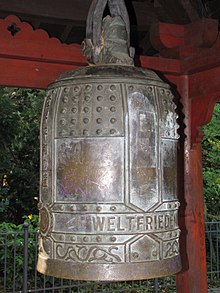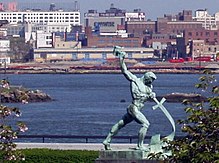World peace
![]()
This article describes the state without war. For the paddle steamer of the same name, see World Peace (ship).
![]()
This article or section needs revision. More details should be given on the discussion page. Please help improve it, and then remove this tag.
![]()
This article or subsequent section is not sufficiently supported by evidence (e.g., anecdotal evidence). Information without sufficient evidence may be removed in the near future. Please help Wikipedia by researching the information and adding good supporting evidence.
World peace is the expression for the ideal state of a worldwide peace, i.e. for the end of all hostilities and all wars - currently of the ongoing wars and conflicts. It implies lasting freedom, justice and happiness for all people and nations. These are often considered the highest goals of all politics and science. It is sought in many ways by the international peace movement, by individuals, non-governmental organizations, groups and parties. Others see it as an unattainable utopia.

World Peace Bell in Volkspark Friedrichshain
Origin of the ideal
Universal peace worldwide, as a prophecy, an idea, a goal of creation after the appearance of the Messiah, was first given to the knowledge and understanding of the world through Judaism. It is said in the prophet Micah:
"He pronounces justice in the strife of many peoples; he rebukes mighty nations [even far away]. Then they forge plowshares from their swords, and pruning knives from their spears. No longer do they draw sword, nation against nation, nor practice for war. Every man sitteth under his vine, and under his fig tree, and no man startleth him. Yea, the mouth of the Lord of hosts hath spoken. For all nations go their way, each calling on the name of its God; but we go our way in the name of Y-H-W-H, our God, forever and ever."
- Mi 4,1-4 EU
Isa 2:3-5 EU also states:
"He pronounces justice in the strife of nations; he rebukes many nations. Then they forge plowshares from their swords, and pruning knives from their spears. No more do they draw sword, nation against nation, Nor do they practice for war. You of the house of Jacob, come, let us go our ways in the light of the Lord."
The idea of world peace was then linked for centuries, also in antiquity, to the arrival of a world redemption or a ruler who would destroy all enemies and unite all friendly peoples in peace. Many well-known mythologies and religious cults contained these elements (e.g., the cult of Mithras, the cult of the emperor). The desire for a mostly divine redeemer and bringer of peace also lived on in later religions, subsequently also in Christianity as Christ and Saviour. Thus the New Testament proclaims peace on earth at the birth of Jesus Christ.
In 1824 Ludwig van Beethoven created his Ninth Symphony, in which he adapted Friedrich Schiller's poem Ode to Joy. It is, especially in view of times of political reaction and princely rule, a song of hope for a former world peace: "All men become brothers".

Swords to Plowshares , a sculpture by Jewgeni Wutschetitsch of the 'United Nations Art Collection', New York
Common ethics and religious peace as a condition for world peace
In more recent times, one of the best-known religiously motivated initiatives for lasting peace is the Global Ethic project of the theologian Hans Küng. In it it is made clear that peace in the world is only possible through peace, tolerance and respect between religions and through ethical action.
Questions and Answers
Q: What is world peace?
A: World peace is an idea of freedom, peace, and happiness among everyone. It is the idea of a world without violence, where nations try to work with each other and have equal human rights, technology, free education for everyone, engineering, availability of medicine, diplomats and/or an end to all forms of fighting.
Q: What did a report in May 2011 on the Global Peace Index find?
A: The report found that if the world had been 25% more peaceful in the previous year, the global economy would have had an additional $2 trillion which could have covered 2% of the GDP per year required to avoid the worst effects of global warming as well as cover all costs to achieve the Millennium Development Goals and cancel public debt held by Greece, Ireland and Portugal.
Q: Do many religions believe in world peace?
A: Yes, many religions believe in world peace. The League of Nations and United Nations were created to make world peace possible.
Q: Is it possible for humans to prevent violence?
A: Some theorists believe that humans are born to be violent so preventing it may not be possible because it is nature. Others say that criminals do not believe in peace so they will continue committing crimes regardless.
Q: How much money would global economy have gained if there was 25% more peacefulness according to Global Peace Index report?
A: According to Global Peace Index report from May 2011 if there was 25% more peacefulness then global economy would have gained an additional $2 trillion which could have covered 2% of GDP per year required for avoiding worst effects of global warming as well as covering all costs for achieving Millennium Development Goals and cancelling public debt held by Greece Ireland and Portugal.
Q: What organizations were created for making world peace possible?
A: The League of Nations and United Nations were created for making world peace possible.
Search within the encyclopedia